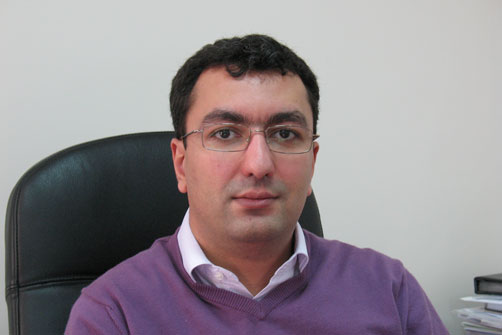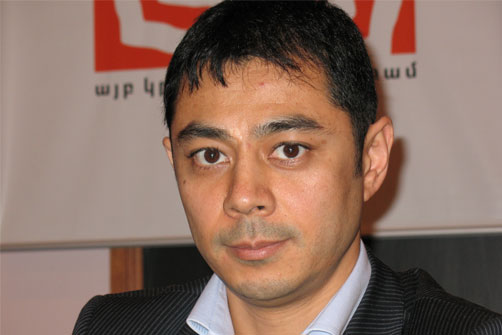-

General Director of “GNC Alfa” Company Hayk Faramazyan
17:01 | 06.04.10 | Interviews | exclusive 16386
“We initially aimed at market liberalization”
Interview of the General Director of “GNC Alfa” Company Hayk Faramazyan to Mediamax Agency and Itel.am portal
- Entry of “GNC Alfa” to the market led the telecommunication market of Armenia to significant changes. What path did the company go and which are its main goals?
- The main goal of the company is to become one of the backbone fiber-optical operators in Armenia. After long market research, the shareholders of the company came to a conclusion that there is no high quality offer and competition in the sphere of telecommunication services in Armenia, especially in the regions.
As it is known, there was only one operator functioning before us in Armenia – “ArmenTel”, which possessed a fiber-optical network covering the entire country. Thus, “GNC Alfa” considered its main goal to be the liberalization of this sphere, as well as provision of exit to international channels in order to make wholesale internet services of higher quality and more affordable.
“GNC Alfa” received legal registration in 2007, and started activity since 2008, by concluding a cooperation agreement with “ArmRosGazprom” and by building a fiber-optical cable along Iran-Armenia gas-pipeline. Further on our cable connected to the Iranian telecommunication operator, through which we secured an exit to the external world. This section of the network was put into commercial operation in September-October, 2009.
Since October 15, 2009, “GNC Alfa” started provision of wholesale internet services and in 3-4 months became one of the main players in the market.
On September 17, 2009, the Armenian government allowed the company building a fiber-optical network in northern regions of Armenia, mainly along highways. The company immediately started construction, which lasted only four months. A few days ago we started operation of our network in the direction of Georgia.
In the North we have two exists, where our network is connected to three Georgian operators. At present, we test IP transit through the territory of Georgia. Commercial operation of our exits to Georgia will significantly improve quality of connection and will make prices more affordable.
By launching strategic cooperation also with the “South Caucasus Railroad” Company, we started designing the fiber-optical network along the railroad in the direction to Sevan, Vardenis and Sotq, as well as the one of Ararat marz town. In 2010, we plan to make our network available almost in all urban settlements of Armenia (25-30 towns). In particular, about 10 towns in the north of the country will join our network in the course of the nearest few days.
The capacity of our network makes 10Gb/sec, which is quite a high transmission capacity for Armenia and we believe that in the course of the nearest 5-6 years it will not be used at full capacity. And if the demand exceeds all our forecasts, we can expand the network up to 20Gb/sec capacity.
The network is fully built on ultra modern technologies of our main suppliers – American Juniper Networks and Cisco Systems producers. There are very few countries in the world, which can be proud of having such an IP/MPLS network, especially of possessing a general republican coverage.
Our customers are Orange Armenia and VivaCell-MTS, as well as almost all internet providers in Armenia.
We are also the main Armenian company, which provides service of telecommunication transit. Soon we plan to provide transit services on the territory of Armenia in the direction to Iran, Middle East and other Asian countries.
- The Armenian government plans to set up a national “backbone” fiber-optical network for its own needs. Will “GNC Alfa” infrastructures be used for that?
- According to the governmental program, all structures of state administration will be included into a single network in order to realize programs on e-management, education, etc. “GNC Alfa” is one of the main candidates for providing such network services to the government. The program is yet at the conceptual stage. We are actively involved in this process and we think that its main part will be realized due to our network capacities.
- How did you manage to acquire so many customers in such a short period of time, taking into account the fact that there had been already 2 wholesale operators functioning in the market?
- Our policy initially aimed at market liberalization. We are very flexible in our relations with customers. By securing international exists for mobile connection operators, we allow them, with the use of our cable, importing a part of consumed internet via independent international channels. Thus, today internet is imported to Armenia not only by “ArmenTel”, “FiberNet” and “GNC Alfa”. Arriving in the market, in which 2 significant competitors had already been functioning, we managed to carry out a quite flexible price and agreement policy and meet the demand of a significant part of the market.
- When purchasing international exits, do you cooperate with the same Iranian and Georgian operators, as your competitors do?
- We have no alternatives in Iran: there is state monopoly called Iranian Telecommunication Infrastructural Company there. And both “ArmenTel” and we are connected to it. On the Armenian-Georgian border, we connect to networks of three companies. At that, “ArmenTel” also connects to them.
- In that case, what was the factor that allowed you offering more competitive tariffs? In general, since internet itself is a virtual market, it is incomprehensible for many people why importers state that the price for internet depends on the volume of import and the number of importers.
- First of all, the increase in the number of importers creates a healthy competition field, and in order to win the market, they start carrying out tougher negotiations with their foreign partners, trying to reduce prices and improve the quality.
On the other hand, the volume of internet, purchased on the border, is in direct relation to the price for its unit. The larger the purchased volume, the lower the prime cost of each unit.
After our entry to the market, the purchased volumes increased 2-2.5 times: the prime cost of the purchased internet decreased to the same degree (already in November, 2009). If previously the price for 1Mb of internet made $800-850 on the border, right after our entry it reduced to $400-450, and further on – to $350. The launch of two exits to Georgia will allow preserving the tendency of price reduction. In the nearest future, I believe, the prices will reduce again for 30-40%. The tendency of price reduction, I think, will be maintained by the end of the year.
- What is your assessment of the reaction of competitors to the arrival of “GNC Alfa”?
- Competition significantly intensified, and this is to benefit the consumers. In a very short period of time, we see increase in the number of connection channels, alternative solutions, broadening of international exits, as well as significant reduction of prices.
- Public Service Regulatory Committee (PSRC) stated that it would carry out strict control over the market, aiming at ruling out dumping cases. How realistic, according to you, is the likelihood of dumping in the telecommunication market of Armenia, taking into account the fact that we have the highest prices for internet in the region?
- It is not ruled out that certain companies, in order to preserve their positions in the market, will start selling services at a price lower than the prime cost, which, per se, is not a sign of healthy competition. However I do not think that there will be players, which will work at a loss. I hope that everyone will be reasonable and will continue carrying out healthy competition.
Concerning prices for internet services, here Armenia already equals to the region: the difference in prices is very small.
- Do you plan to enter retail market?
- Focusing mainly on wholesale market of internet services, we, nevertheless, are preparing to provide large companies with services of virtual networks and internet. Having a republican coverage network, the company has the chance to offer these services to large companies, banks, which have branches in various regions. We plan to launch provision of this service since mid-April.
- Possessing primary access to internet, won’t you have more favorable competitive position, as compared to other providers?
- I do not think so. There are companies, which offer corporate customers more affordable services, than we do. This is conditioned by internal expenses of the providers, particular approaches, etc.
We offer internet service providers conditions for them to be able to offer their customers the same services at the same or even lower tariffs than we do. We do not strive for a dominating position.
- Do you rule out the possibility that you can be declared a dominating company in any segment of the market of internet services?
- That is not ruled out. According to our legislation, if one third of the particular market falls on the share of one entity (and I think that we will soon reach that index), it is declared dominating. This does not scare me, since being declared dominating in the market is not a violation itself, it is a certain status, which should not be abused. We respect the letter of the law.

17:29 | 24.09.25 | Articles
Jacopo Losso on Cross-Border Investments and Why Armenia Attracts Angels







